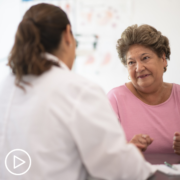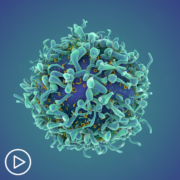Evolving Myeloma Treatment Options: How You Can Access Cutting-Edge Care from Patient Empowerment Network on Vimeo.
With the quickly evolving landscape of myeloma treatment and care, it’s important to work with your healthcare team to determine a care plan. In this program, Dr. Omar Nadeem discusses the latest updates in research and clinical trials, the role of new and emerging therapies– including bispecific antibodies and CAR T-cell therapy–and shares advice for accessing quality myeloma care.
Dr. Omar Nadeem is the Clinical Director of the Myeloma Immune Effector Cell Therapy Program and Associate Director of the Multiple Myeloma Clinical Research Program at the Dana-Farber Cancer Institute. Learn more about Dr. Nadeem.
Download Resource Guide
See More from Evolve Myeloma
Related Resources:
Transcript:
Katherine:
Hello, and welcome. I’m your host, Katherine Banwell. As patients collaborate on treatment decisions with their healthcare team, it’s important that they understand all of their options and how these options may be impacted by research developments. That’s why the Patient Empowerment Network created the Evolve series, to arm you with the latest information and help you feel empowered and confident during conversations about your myeloma care.
In today’s program, we’re going to hear from an expert in the field about the evolving treatment landscape and discuss how you can play an active role in your care. Before we get into the discussion, please remember that this program is not a substitute for seeking medical advice. Please refer to your healthcare team about what may be best for you. Well, let’s meet our guest today. Joining us is Dr. Omar Nadeem. Dr. Nadeem, welcome. Would you please introduce yourself.
Dr. Nadeem:
Thank you. Hi, everyone. My name is Omar Nadeem from the Dana-Farber Cancer Institute. It’s my pleasure to be here.
Katherine:
Thank you so much for joining us today. Before we get into our discussion, would you share with the audience how the field of myeloma care has changed over the course of your career?
Dr. Nadeem:
Yeah, and things are changing so rapidly. My career started after my training in 2015 and at that time, daratumumab (Darzalex) just had its approval in relapsed/refractory multiple myeloma. That, along with several other monoclonal antibodies a few immunomodulatory drugs and proteasome inhibitors.
At that time, it felt like myeloma was at the forefront of significant advances and change in practice, which it was. Little did we know that we were right around the corner with the next renaissance of myeloma therapy, which is these immunotherapies that have been approved over the last three to four years now. So, safe to say things are changing so, so fast and it’s leading to excellent outcomes for patients.
Katherine:
Yeah, it’s great news. So positive. I’d like to start with the importance of a patient’s healthcare team. What are the benefits to seeking care with a myeloma specialist, even if it’s just for a second opinion or a consult?
Dr. Nadeem:
Yeah, so, myeloma is a little less than 2 percent of all cancers, and it’s the second most common blood cancer, so certainly not rare. With that being said, if you go to a general community practice, they don’t typically see too, too many patients with this disease. So, alongside that, we have so many different treatment options and combinations and these, as I mentioned, immune therapies.
And other therapies that are only actually carried out at academic centers for now, such as stem cell transplants, and CAR T-cell therapy. I think it’s important to kind of meet with an academic provider just to get a sense of what the patient may be facing, both in that immediate time, but also in the future, because a lot of myeloma therapy is lifelong. And in that case, you do have to come up with a plan for your whole treatment in a way early. So, it’s important to kind of one: hear it from another person, and then two: really sort of figure out what the outlook would look like for the individual patient.
With that being said, many of our myeloma regimens that are approved can very easily be given at the local provider, and that’s usually our preference, for patients to be treated closer to home. So, ultimately, this is another way for patients to get input about their treatment program, but also talk about the future.
Katherine:
That makes sense. Specialists at academic medical centers are typically more involved in research and clinical trials.
And patient participation is essential to advancing medicine. So, how do clinical trials impact myeloma care?
Dr. Nadeem:
Well, everything that we have available today for myeloma therapy was once in a clinical trial. So, all these promising therapies usually start in early phase studies and move on to Phase II and Phase III studies, and then those are the ones that the FDA uses to approve a particular combination.
So, it all depends on kind of where someone is in their disease course. It also kind of depends on what their preferences may be in terms of taking on something that is beyond standard of care. So, as part of any clinical trial in whatever phase it may be, whether its newly diagnosed multiple myeloma, even smoldering myeloma, which is one step before that, relapsed/refractory myeloma.
At each step of the way, there are clinical trials that are there trying to improve upon what’s already out here, right? So, we are, despite all these amazing advances, unfortunately, the disease is still not curable for a vast majority of patients.
In that case, how do we move to that cure, or how do we kind of advance the disease even beyond this? And a clinical trial is a way to do that.
Katherine:
What type of patient is most appropriate for a clinical trial?
Dr. Nadeem:
So, there are criteria that each clinical trial uses in terms of eligibility. Some of that has to do with the disease characteristic itself, kind of where somebody is in their disease course, but many times it’s also patients’ fitness, organ status in terms of kidney function, their blood count to some extent, heart function, etcetera. There are some sort of minimal prerequisite guidelines that we have to enroll patients in trials. So, it really, again, depends on where somebody is in their disease course and what they may be willing to take on beyond what may be offered to them as part of standard of care.
Katherine:
What questions should patients be asking if they’re entrusted in participating in a clinical trial?
Dr. Nadeem:
I think the important thing is to sort of first recognize what’s available to them as part of standard of care and then what the clinical trial is trying to answer.
So, for example, if it’s newly diagnosed multiple myeloma, we now have quadruplet regimens that we give to patients at the time of their diagnosis, and then the next natural question for eligible patients that now comes up is whether they should do a stem cell transplant or not.
And alongside that goes with all these advances in immune therapies, such as CAR T-cell therapies and bispecific antibodies. And there are now trials looking at those therapies and comparing them, for example, to stem cell transplant to try to answer the question “Can we get even beyond something like a stem cell transplant?”
So, that’s one example of a trial where a patient may be interested in saying “Okay, well, a transplant may be my standard path, but what if I try to enroll in this study and get randomized, for example, to the CAR-T arm? Then, perhaps, I’m getting access to some of these therapies early and maybe that’s going to improve my outcomes.”
Katherine:
Well, I’d like to talk about some new and emerging therapies in myeloma, starting with CAR T-cell therapy. Can you talk about who this treatment option might be appropriate for?
Dr. Nadeem:
So, yeah, just to kind of give folks background, CAR T-cell therapy is a form of immunotherapy, where we take out an individual’s T-cells and then re-program them, essentially, to recognize myeloma cells. Right now there’s two approved CAR-T products for multiple myeloma, both in the relapse refractory setting. It’s really for patients that have had four or more lines of therapy.
So, that’s a lot of different combinations that we currently have available. Those therapies stop working before patients are actually eligible for CAR-T cells at the moment. Both of these CAR T-cell products have been gamechangers in terms of improving prognosis for patients.
The good thing about CAR-T cells is that it is a one-and-done treatment. So, patients, when they go through that initial phase of therapy, they are then off therapy, although we are now starting to study certain therapies that we may administer after CAR-T cells to get them to last even longer than they currently do, but that’s still in, for example, that’s one of the clinical trials or many of the clinical trials that are currently ongoing now, to try to answer that question.
So, a lot of patients can be eligible for CAR-T cells. They have to have the prerequisite amount of therapies. Again, there are some sort of baseline fitness characteristics that we look at for patient’s ability to tolerate it. But as a whole, I consider CAR T-cell therapy more broadly applicable to myeloma patients than compared to, let’s say, a stem cell transplant.
Katherine:
How has this therapy revolutionized myeloma care?
Dr. Nadeem:
Yeah, before the first approval, now a few years ago, in this space we didn’t really have anything like this to offer patients. So, many of the combinations and other compounds that were in clinical trials would have a response rate somewhere around, let’s say, 30 percent. So, 30 percent of patients may respond to that therapy in that space, and that may only last a few months, and that was considered successful not that long ago. Now, with CAR T-cell therapy and bispecific antibodies, these therapies are highly efficacious.
You see response rates of 70 to 100 percent in some of these immunotherapies, and what that’s translating into is patient’s disease staying away for a year or two years, even three years in some of these clinical trials. And again, this is completely unprecedented compared to what we had before.
Katherine:
I understand that there are a number of clinical trials for different types of CAR T, or even using it earlier in the disease. Can you share updates in CAR T-cell therapy research?
Dr. Nadeem:
Yeah, so, exactly as you pointed out, there have been trials already, actually, that have been completed, Phase III studies looking at CAR T-cell therapies in earlier relapses. So, patients that have had either one of two lines of therapy.
Both our CAR-T therapies have been compared to standard of care in that space and have shown superiority, and this is something that we all have been kind of waiting for to see if you deploy it earlier, perhaps you’re going to see even greater benefit, and that seems to be the case in some of these trials, and now we’re awaiting, hopefully, approval of some of these CAR T-cell therapies to be administered earlier because in fifth line, it’s very different than treating patients in second or third line, which I think will really vastly improve our ability to deliver this therapy to many patients, as it can be quite challenging for patients that are in fifth line, to allow them to go through the process of CAR-T cells and then having them be administered.
I was looking at it head-to-head with stem cell transplant, as I mentioned before, and this is in the context of quadruplet and induction therapy followed by either CAR-T cells or stem cell transplant, and then followed by maintenance therapy. So, really trying to see if I can overcome what we typically have achieved with stem cell transplantation.
We also are doing some studies even before that. So, patients, again, in high-risk smoldering myeloma, which we know have an increased risk of developing newly diagnosed disease in the next few years, perhaps that could be the time where we can give some of these immunotherapies, and that’s some work that we have going on at our center.
Katherine:
Well, another therapy that has emerged in myeloma is bispecific antibodies. What patient type is this therapy right for?
Dr. Nadeem:
So, bispecific antibodies are great because they’re off the shelf. What that means is that CAR-T cells, we first have to collect the T cells and we then have to send them off to be manufactured, and that manufacturing process can take up to a month, sometimes even longer, for some of the current available CAR-T products. And then, after the cells are returned to the facility, we then give usually three days of chemotherapy to try to suppress some of the immune systems of the patients. So, that way, when the cells are administered, they can expand robustly and do essentially what they need to do.
So, that whole logistical process can take a couple of months by the time you identify somebody for CAR-T cells and then, from that moment until they can actually be treated. With bispecific antibodies, if we think somebody’s ready to go, you can basically get it as soon as we can have somebody ready to go either in our clinic or on the in-patient facility. So, they’re much easier. They also utilize T cells to attack myeloma cells. We now have three approved bispecific antibodies. Two of them are targeting BCMA, the same exact target that we have in CAR-T cells, and one of them is now targeting a new target called GPRC5D, which is also highly expressed on myeloma cells.
So, having all these bispecific antibodies available is excellent because patients can have access to them a lot faster and now we’re trying to answer the question of sequencing. Can you give bispecific antibodies after CAR-T cells for example? Can you give one bispecific antibody after another, especially if there’s a different target that we now have available?
As a whole, though, bispecific antibodies tend to have lower response rates than CAR-T cells, particularly Cilta-cel (Carvykti), which is cilta-cel that has a very high response rate of close to 100 percent.
Most bispecific antibodies have response rates somewhere around 70 or so percent, so about two-thirds of patients respond to these therapies, again, in that fifth line or four or more lines of therapy. So, in that space, that’s the response rate. And across the board, generally speaking, patients benefit from these bispecific antibodies approximately a year on average. Some of the studies have shown longer benefit, and it also depends somewhat on response to therapy.
Patients that have a really deep response can go even way longer than that. So, it is quite mixed in terms of how somebody may do on these bispecific antibodies, but those are the numbers.
Katherine:
Well, it sounds like bispecific antibodies have really transformed myeloma treatment options.
Dr. Nadeem:
Absolutely, and what goes hand in hand in this.
I mentioned the logistics of CAR T, but then there’s also the supply and availability of CAR-T cells. Since the approval, the demand for CAR-T cells has been very high because of all these excellent results, but the supply really hasn’t been there. So, even at a center as busy as ours, we can only treat a handful of patients with CAR T-cell therapies compared to bispecific antibodies, where that is essentially an injection similar to many other approved myeloma agents that you can just readily treat patients with. So, CAR-T cells, while I think, again, have higher efficacy, with that comes slightly higher toxicity as well. It’s a very different kind of treatment program.
And then, patients get a treatment-free interval, which you don’t see yet with bispecific antibodies. On the other hand, bispecific antibodies are readily available, slightly lower response rates, slightly lower toxicity when it comes to at least the traditional T-cell directing toxicities. And then you have, again, the readily available nature of it, which I think is hugely beneficial for patients.
Katherine:
You talked about some specifics regarding bispecific antibodies, but are there updates in bispecific antibody research that you’d like to share?
Dr. Nadeem:
Yeah, so, again, kind of following the theme of what we just said about CAR-T cells, can you bring these antibody therapies earlier? And there’s ongoing trials now looking at it in newly diagnosed multiple myeloma and early relapses, and then we presented our data at ASH this previous year looking at it in high-risk smoldering myeloma. We treated patients with teclistimab (Tecvayli), which is a BCMA bispecific antibody that is approved for relapse refractory patients. And what we demonstrated in that study is that people that got Teclistimab had a 100 percent response rate with an MRD-negative rate. So, kind of as deep of a response as we can measure, also at 100 percent.
So, this is something that we had not seen before. When their immune systems are a lot healthier, they may benefit more. So, hopefully we’ll see confirmation of these results in other trials.
Particularly in the newly diagnosed space because we do think that these antibody therapies have such huge potential to treat patients, and then hopefully we’ll have durable responses. So, I do think that some of this paradigm may shift over the next few years, and then there’s also combinations that are currently being studied: combinations with traditional myeloma therapies, such as monoclonal antibodies, other immunomodulatory agents, or proteasome inhibitors. All these combination trials are now ongoing to see can you improve upon some of those numbers that I highlighted before with single-agent bispecific antibody therapy.
Katherine:
Oh, I was just going to ask you the next question, which is are there other emerging myeloma therapies that are showing promise?
Dr. Nadeem:
Yes. So, I think over the last few years, most of the buzz has been with these immunotherapies. And, again, more work to be done there to see whether combinations, different schedules, different targets, different types, will show more and more benefit in each of these myeloma disease settings.
But we also have simultaneous development of other agents that are not in this sort of immunotherapy T-cell redirecting therapy realm. We have newer versions of our classic immunomodulatory drugs, such as lenalidomide (Revlimid) or pomalidomide (Pomalyst).
We now have their next generation agents, called CELMoD drugs and there’s two of them in development. One of them is called iberdomide; one is called mezigdomide.
These are, again, kind of building up on the success of some of these previous therapies that are kind of cornerstone therapies for myeloma patients and because these are essentially better agents, they’re more targeted, and they also have greater response rates as single agents and as combinations.
We’re hoping that these would be approved in the not-so-distant future and then perhaps will replace some of these immunomodulatory drugs that we have currently utilized in newly diagnosed and relapsed myeloma. Essentially what this means is things are just getting better and better and better as we get newer versions of some of these therapies. So, those are, I would say, kind of next in line in terms of hopeful approvals.
And then we’ll add to some of the options that we have for myeloma patients.
Katherine:
How can patients and care partners stay informed about the latest myeloma research?
Dr. Nadeem:
Yeah, it’s a lot of moving parts all the time. From one six-month interval to the next, you tend to have nowadays perhaps some drug approvals, which is amazing, but if not updates of all these sort of combination trials, etcetera, of where these things are going. I think kind of talking to your physician, obviously, about some of these updates is really critical. As I mentioned before, having a roadmap in your mind about what the myeloma therapy for you might look like going forward, wherever you are in your disease state, is always important because it gives you time to sort of think about it, learn about it, prepare for it.
Some of these therapies really require an effort from the patient and their caregivers because, for example, for CAR-T cells. If you’re not near a center, you may have to relocate for a month.
And it’s very difficult, and we fully understand that and try to help as much as we can, but that’s the kind of commitment that it takes. So, talking to your physician, obviously content like this, reviewing this as much as you can. Online patient support groups are great because you learn from the other patients’ experiences. So, the good news now is we have so many channels of communication, but you have to in a way, in the end, discuss with your physician and verify things you may find on your own.
Katherine:
Exactly, yeah. You want to make sure you’re getting facts rather than fiction.
Dr. Nadeem:
Yeah. That’s right.
Katherine:
Well, Dr. Nadeem, we’ve been hearing the term personalized medicine more frequently in recent years. How would you define personalized medicine for myeloma, and how can patients access this type of care?
Dr. Nadeem:
Yeah, personalized medicine or precision medicine is a term that we’ve really sort of used for many oncologic conditions over the last decade or so. I would say, for multiple myeloma, in terms of identifying a target within the myeloma cell that’s unique to the patient.
And then deploying a certain therapy to that patient because of that target is still lacking. We do have one example where patients have, for example, an 11;14 translocation, which we see in about 15 percent of myeloma patients.
There’s an agent called venetoclax (Venclexta) that is very active against that particular cohort of patients, although that is still not approved to be used, but that’s one example where that agent specifically benefits that type of myeloma. Other than that, most of the therapies that we have benefit essentially everybody with myeloma, which is great, but it’s not so personalized.
Where I would say there’s the most personalization happening now, at least in my practice, is looking at which types of therapies an individual patient may receive. What I mean by that is if somebody’s in an excellent response, with quadruplet-based induction therapy, I have a very real discussion with them about the pros and cons of stem cell transplant. We make those decisions in real time depending on how the patient doing, depending on how their response is.
And then kind of deciding a whole kind of what are the kind of risks and benefits and what makes sense for that individual patient. Similarly, when you go on to maintenance therapy, maintenance therapy means that after you’ve gone through the initial phase of your myeloma therapy and the disease is under control, what type of therapy can we keep you on to keep it under control for as long as possible? Historically, that has been lenalidomide or Revlimid. Now we’re adding drugs such as daratumamab and other agents to Revlimid to see if that can further prolong the response to that initial therapy.
So, all those decisions are so individualized that you have to discuss with your provider what makes sense for you and what are the pros and cons of doing one approach versus the other.
Katherine:
Well, if we’re talking about in-depth testing, how do the results of that testing affect treatment options?
Dr. Nadeem:
So, right now we use conventional blood tests to get a sense of response in the vast majority of patients. That includes the serum protein electrophoresis and the serum free light chain assay.
Most patients have detectable levels of these proteins, abnormal proteins in the blood at diagnosis and then you can follow them using a blood test. There’s a subset of patients that have disease only that shows up on scans. So, we then kind of incorporate some of those scans and then, also, utilize the bone marrow results both in the beginning and in subsequent analyses to kind of give a big-picture composite response assessment for that particular patient. Nowadays, there are also other tools that we’re using, such as MRD, or minimal residual disease.
That is a test that is done on a bone marrow biopsy to determine, if you don’t have detectable protein in the blood, do you have myeloma cells present at the deepest level possible? And if you do versus if you don’t, trials have shown that there is a difference in terms of prognosis. Now, while that hasn’t fully been utilized yet to make treatment decisions in patients that are not on clinical trials, we do get prognostic information out of it, and nowadays, more and more of those trials are using these MRD tests to determine what to do with treatment.
And I think that’s how it’s going to be in the future. So, having those extra tests available but, again, important to discuss with your provider what is the utility of this test. How are we going to use this information for your individual case to make some decisions?
Katherine:
What questions should patients be asking their provider about a proposed treatment plan?
Dr. Nadeem:
Yeah. I think because myeloma therapy’s so nuanced and much of this is still in clinical trials or under investigation about what to do with some of these results, I would say, as a whole, it’s important to know which tests the physician looks at to determine how you’re doing, and kind of what their assessment of that result is. So, for example, if somebody’s had a 50 percent reduction in the amount of abnormal protein in the blood, is that sufficient, or should we be aiming for a number that’s much higher than that?
Some of that depends on kind of where they are in their treatment course, but that’s a very sort of reasonable question to ask your physician is that where do you see my response now, let’s say six months into therapy, and is this adequate, and what is now, after we have all this information, what is my roadmap going forward to try to keep this disease in check?
Katherine:
Yeah. Well, that’s great advice, Dr. Nadeem. Thank you. PEN has also created a downloadable office visit planner to help you organize your thoughts and communicate effectively with your healthcare team. You can find these at Powerfulpatients.org/myeloma.
I’d like to turn to self-advocacy, Dr. Nadeem. Why is it so important that patients engage in their care treatment decisions?
Dr. Nadeem:
Yeah. As I mentioned, myeloma therapy is so individualized now and we can sit here, look at the trial data, get very into the weeds and technical about this therapy with this approach as X or Y higher response rate.
Or MRD-negative rate, but in reality, we’re dealing with people and we’re dealing with people that have lives. They have all their priorities, and until you share that with us, it’s very difficult for us to know exactly what’s important to you. So, what I may consider to be kind of the “best therapy” for you may not make sense for you because of all the priorities that you may have, and I think it’s so important to advocate for yourself and not be afraid to bring that up to your physician because I think many patients kind of hold that stuff in for a long time because they don’t want it to impact their care. But I would argue the other way around.
Tell us. Tell us exactly what you prioritize. Tell us if you can’t be out of commission for work for X amount of time because of a stem cell transplant. We now have options. We now have options for patients because of all these amazing new therapies for myeloma and we can come up with a very individualized treatment plan for you based on your priorities.
Katherine:
If a patient is feeling like they’re not getting the best care or they’re uncomfortable with the care they’re receiving, what steps should they take to change that?
Dr. Nadeem:
Yeah, I think that’s very difficult because this is a complex system. Medical systems are getting even more and more complex. They’re busy. Everybody’s busy: busy offices, labs, radiology. We’re all feeling that. It doesn’t matter where you are. So, I think it’s important to raise those concerns, number one, to your practice that you’re being seen at because they would like to see that feedback, right? So, kind of see what is something that they can perhaps improve upon. I think it’s always important, like we just said, to advocate for yourself and raise some of these issues and not be afraid of that.
We’re all in this together, right, so I think ultimately, we’re all trying to take the best care of you and we would need to know which part of that may or may not be working so well.
Katherine:
Let’s get to a few audience questions that we received prior to the program. This one is from Rita. “Is there an age limit on CAR T-cell therapy?”
Dr. Nadeem:
So, no, there isn’t. A lot of age-related cutoffs that we’ve historically used for transplants or even the CAR T originally don’t really apply because we all know there’s patients that are in their late 70s that may be more fit and robust than somebody in their 50s. We see this all the time. So, frailty is something that we assess quite a bit in patients in determining whether they can handle some of the toxicities that may come from these therapies. So, there’s no age cutoff.
Again, we look at certain other medical problems you may have, how fit you are, your organ function and things like that, but ultimately the goal is can you tolerate the chemotherapy you get before CAR-T cells and then can you tolerate some of the acute toxicities of CAR-T cells, such as the cytokine release syndrome, some risk of neurological toxicity, things like that. All of those are usually short-term, and if you feel confident that we can get you through that, then you’re eligible.
Katherine:
Yeah. Laura sent in this question: “I’m considering bispecific antibody therapy. I know some of the side effects are similar to CAR T-cell therapy. Can you share the pros and cons of bispecifics and how it compares to CAR T?”
Dr. Nadeem:
Yeah. I think we mentioned earlier that as a whole, they’re very similar. They’re both T-cell re-directing therapies, in many circumstances, with the same exact target of the myeloma cell, but because this isn’t a cell infusion – this is a cell injection – that you receive that redirects your T cells to the myeloma cells, you tend to see a little bit of a lower toxicity signal when it comes to the cytokine release syndrome incidents and severity. You see lower neurological toxicity, usually, than you do with CAR T-cell products as a whole.
With that comes slightly lower efficacy than you see with at least some of our CAR-T products, but if you respond to therapy, then the durability of response can be as good as you can achieve with CAR-T cells. One thing to note about the bispecifics, though, is that it is continuous therapy, so you are getting it on some regular schedule. Right now the approval is for it to be given weekly and then go to every two weeks after six months of therapy if you’re basically in a good response.
A lot of that is to try to mitigate the risk of infection. So, that is one of the biggest things that we have seen with bispecifics more so than CAR-T cells. Because it is continuous administration of these therapies, that really suppresses your immune system significantly, and infection rates are quite high. So, we typically give other ways to try to mitigate that using immunoglobulin infusions to try to boost up your immune system. Typically, we do that once a month for patients, making sure you’re on the right prophylactic medications and then really adjusting the therapy and the schedule to you depending on your tolerability.
So, as we said before, it’s an excellent option. I think bispecific antibodies are going to be the mainstay of myeloma therapy going forward because CAR-T cells, again, we can’t really treat everybody with CAR-T cells just simply because of the dynamics of how the process is. So, having the bispecific antibodies available for patients is excellent.
Katherine:
Thank you for this information, Dr. Nadeem. And please continue to send in your questions to questions@powerfulpatients.org and we’ll work to get them answered on future programs.
We’ve definitely learned today that the field of myeloma care is advancing quickly. As we close out the program, what would you like to leave the audience with? Why are you hopeful?
Dr. Nadeem:
Yeah. I think you all can see the tremendous progress that’s been made and, again, I still think it’s sort of the tip of the iceberg. These immunotherapies that are really showing this kind of activity, we’re just learning about them, and we’re going to improve them, not just the way we administer them. We’re going to make them even better and better and better and our hope is that a cure is not so far in the future. And perhaps even now we can cure a subset of patients if we deploy some of these therapies in the right person at the right time. So, I think that is really what I am hopeful for, that we have all these options available.
Now it’s up to us to figure out which one fits in where and then, as we do that, hopefully we’ll see even better and better outcomes. And my hope is, over time, that this is a disease that we can cure at least in a subset of patients, which means that they get fixed duration therapy with whatever that we have.
And then they’re done, and then hopefully never have to have therapy for this disease because it’ll be gone, and then, in patients that develop a disease relapse, we then treat them with some of these other agents. So, this is starting to hopefully mirror what we see in other blood cancers, such as lymphoma, for example, where you give the initial therapy and cure a subset of patients. Hopefully we can get there with myeloma in the not-so-distant future.
Katherine:
It’s a very promising outlook to leave our audience with. Dr. Nadeem, thank you so much for joining us today.
Dr. Nadeem:
Thank you so much for having me.
Katherine:
And thank you to all of our collaborators. To learn more about myeloma and to access tools to help you become a proactive patient, visit powerfulpatients.org. I’m Katherine Banwell. Thanks for joining us today.
























